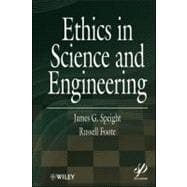
What is included with this book?
| Preface | p. ix |
| Explaining Ethics | p. 1 |
| Introduction | p. 1 |
| The Impact of Science and Engineering | p. 8 |
| The Framework of Ethics | p. 12 |
| Ethics in Professional Life | p. 19 |
| References | p. 24 |
| Scientists and Engineers | p. 27 |
| Introduction | p. 27 |
| Definitions | p. 32 |
| Scientific Disciplines | p. 35 |
| Engineering Disciplines | p. 39 |
| Expert Witness | p. 41 |
| Professionalism | p. 43 |
| References | p. 50 |
| The Psychology and Philosophy of Ethics | p. 53 |
| Introduction | p. 53 |
| Ethical Responsibilities in Research | p. 56 |
| Ethics in Science and Engineering | p. 63 |
| A Phenomenological Theory of Ethics | p. 72 |
| Conflicts of Interest | p. 76 |
| References | p. 82 |
| Education of Scientists and Engineers | p. 85 |
| Introduction | p. 85 |
| The High School Experience | p. 87 |
| The Baccalaureate Experience | p. 91 |
| The Graduate Degree Experience | p. 102 |
| Postdoctoral Education | p. 106 |
| Morals and Values | p. 108 |
| Evaluating Scientists and Engineers | p. 113 |
| Intellectual Property | p. 114 |
| References | p. 119 |
| Scientific and Engineering Societies | p. 123 |
| Introduction | p. 123 |
| Scientific Societies | p. 127 |
| Engineering Societies | p. 131 |
| Codes of Ethics and Ethical Standards | p. 134 |
| Promoting Research Integrity | p. 138 |
| The Effectiveness of Society Activities | p. 140 |
| Academic Freedom | p. 148 |
| References | p. 153 |
| Codes of Ethics and Ethical Standards | p. 157 |
| Introduction | p. 157 |
| Ethics | p. 166 |
| Codes of Ethics | p. 179 |
| The Premise Behind Codes of Ethics | p. 184 |
| Codes of Ethics and Peer Reviews | p. 188 |
| References | p. 191 |
| Integrity in Research | p. 195 |
| Introduction | p. 195 |
| The Nature and Conduct of Research | p. 205 |
| Single Investigators | p. 211 |
| Team Investigators | p. 212 |
| Misrepresenting Credentials | p. 213 |
| Misleading Listing of Authorship | p. 214 |
| Collecting Research Data | p. 216 |
| Bias in Analytical Methods | p. 220 |
| Misuse of the Data | p. 221 |
| Falsification and Fabrication of the Data | p. 222 |
| Plagiarism and Theft | p. 224 |
| The Controls | p. 226 |
| References | p. 231 |
| Publication and Communication | p. 235 |
| Introduction | p. 235 |
| The Scientific and Engineering Literature | p. 241 |
| The Journals | p. 242 |
| Data Manipulation for Publication | p. 247 |
| Detecting Falsified Data | p. 248 |
| Peer Reviewers and Their Duties | p. 249 |
| Duties and Responsibilities of a Journal Editor | p. 252 |
| References | p. 257 |
| Enforcement of Codes of Ethics | p. 259 |
| Introduction | p. 259 |
| Following a Code of Ethics | p. 262 |
| Enforcing a Code of Ethics | p. 264 |
| Reporting Misconduct | p. 274 |
| Published Examples of Unethical Behavior | p. 280 |
| References | p. 288 |
| Glossary | p. 291 |
| Index | p. 301 |
| Table of Contents provided by Ingram. All Rights Reserved. |
The New copy of this book will include any supplemental materials advertised. Please check the title of the book to determine if it should include any access cards, study guides, lab manuals, CDs, etc.
The Used, Rental and eBook copies of this book are not guaranteed to include any supplemental materials. Typically, only the book itself is included. This is true even if the title states it includes any access cards, study guides, lab manuals, CDs, etc.